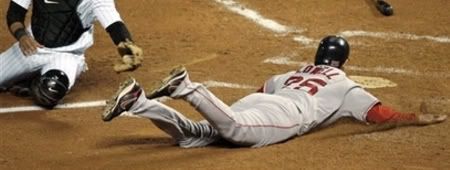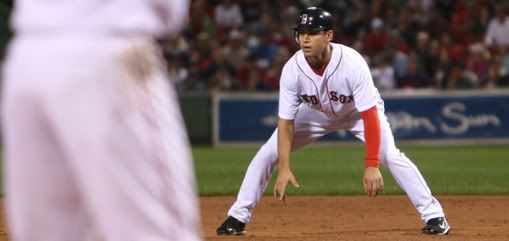 Recently, I saw a Yankees fan write that she wasn't scared of Youkilis at the plate. In fact, their exact words were, "if it’s the bottom of the ninth with a full count, I want Kevin up to bat". Now as someone who's been in the stands when Kevin's hit an incredible 2-out, game winning 2-run home run, I took offense to that. So I did a little research, and you might be surprised what I found out.
Recently, I saw a Yankees fan write that she wasn't scared of Youkilis at the plate. In fact, their exact words were, "if it’s the bottom of the ninth with a full count, I want Kevin up to bat". Now as someone who's been in the stands when Kevin's hit an incredible 2-out, game winning 2-run home run, I took offense to that. So I did a little research, and you might be surprised what I found out.For the purposes of framing this argument, I'll use the old, played-out technique of Player A vs. Player B. And I apologize for doing this, but in this case, I think it's relative.
Player A hit .288/.390/.453 with 16 home runs and 83 RBI. They also hit .329/.429/.573 with runners scoring scoring position, driving in 67 runs in those 149 at bats.
Player B hit .322/.388/.452 with 12 home runs and 73 RBI. They also hit .354/.426/.456 with runners in scoring position, driving in 62 runs in those 147 at bats.
The numbers are eerily similar. I think most people would give the advantage to Player A. Even though he didn't hit for as much average he was more productive overall. As many may have already guessed based on the name of this article, the two players are Kevin Youkilis and Derek Jeter. And knowing that, an astute baseball fan can probably tell which player is which based on the averages and home run totals. But I doubt many baseball fans would have known that the two had such similar numbers.
Now knowing who the players are, Yankees fans may make the argument that while Youkilis drove in 10 more runs, Jeter scored 17 more runs. But that ignores the fact the Jeter had 558 at bats in the 2 spot of the order compared to Youkilis' 256. Over those at bats, Youkilis scored a run every 5.22 at bats. In that same spot in the order, Jeter scored a run every 6.2 at bats.
Now for another comparison. You already know who the players are, but this puts them on an even playing field without the name recognition of Jeter.
Player A has hit .309/.377/.469. in the postseason.
Player B has hit .373/.459/.725 in the postseason.
Judging by Jeter's reputation, I think most be inclined to put his name in place of the player with the better hitting line. And they'd be incorrect. Jeter is actually Player A. I concede here, Jeter has had a much longer history of doing well in the postseason. He has 495 postseson at bats compared to Youkilis' 51. But can you punish a player for what is out of his control? I don't think anyone would take Coco Crisp over Jacoby Ellsbury just because Crisp has had more at bats.
And now for another comparison, but this time I won't be masking the names. Kevin Youkilis won his first Gold Glove last year in his second year at first base. He made 0 errors in 1084 total chances at first. Among others at his position he ranked first in the majors in fielding percentage and sixth in Zone Rating.
On the other hand, Derek Jeter made 18 errors in 607 total chances. Among others at his position, he ranked 16th in the majors in fielding percentage and last in the majors in Zone Rating. From 2005 to 2007, the Bill James Handbook ranks Derek Jeter as the worst defensive shortstop in baseball.
Here a Yankees fan could make the point that while Youkilis is a much better fielder, Derek Jeter is much more valuable on the bases. And indeed, they'd have a point here. Although Jeter had a bad year on the bases in 2007, getting caught more than half as many times as he stole a base, Jeter typically steals about 22 bases a year and gets caught five or six times. Youkilis typically steals five or six bases and gets caught twice.
If you look at Win Shares, Jeter finished with 24 last year, while Youkilis finished with 20. Those are rather similar numbers, especially when you consider that Jeter had much more playing time and played more of that time in front of the heart of his team's batting order.
Considering everything, it would appear as if the abilities of Youkilis and Jeter are very similar. You could even make the argument that Youkilis was the better player last year. Youkilis is also much younger, and has much less major league experience. His abilities may improve over the years. And of course he costs a fraction as much as Jeter.
So next time a Yankees fan tells you they're not scared of Youkilis, you can tell them that you're not afraid of Jeter then. Cause Youkilis outhit Jeter last year, especially in Jeter's trademark areas: with runners in scoring position and in the postseason. Then you can tell them that Youk's goatee was boss.












